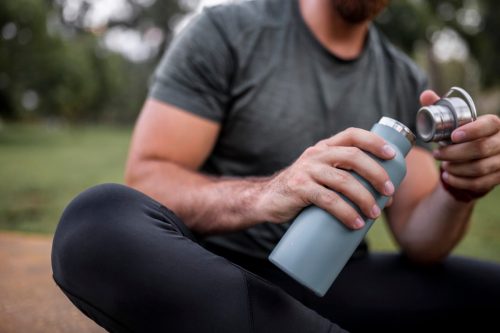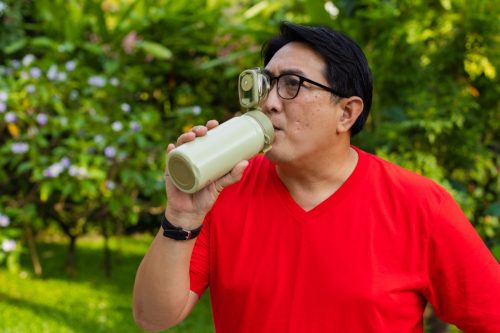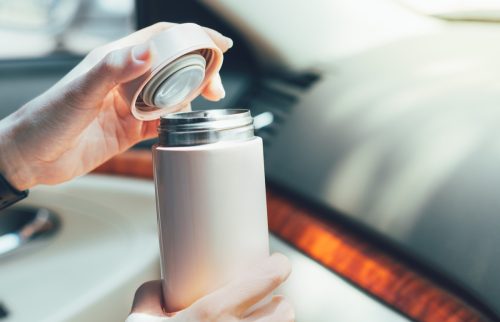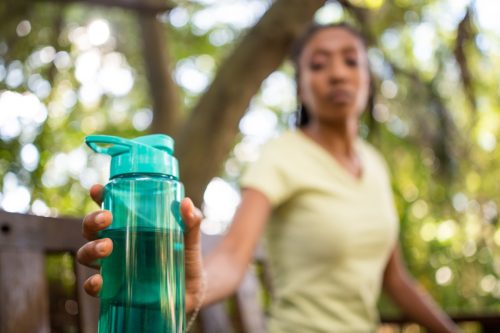5 Signs You Shouldn't Be Drinking Out of Your Water Bottle
Read this before you take another swig.

Before you grab the water bottle off of your nightstand to take your next sip, ask yourself one question: "When was the last time I washed this?"
Many of us reuse the same water bottle for much longer than we'd probably like to admit, filling it up over and over again without cleaning it. But while this may be a common bad habit, that doesn't mean it's safe. In fact, a dirty water bottle can put your health at risk by exposing you to harmful bacteria.
Exactly how long is too long when it comes to reusing your water bottle without washing it? We turned to health experts for some insight on the issue. Read on for what they say are five signs you shouldn't be drinking out of your water bottle.
READ THIS NEXT: What Happens If You Drink Out of the Same Water Glass for a Week, According to Doctors.
1
You notice cracks in the lid

A crack in the body of your water bottle is likely to prompt a replacement, because it'll be leaking all the time. But as David Seitz, MD, the medical director for Ascendant Detox, tells Best Life, damage elsewhere should prompt the same exact response—even if you don't realize it.
"If the lid or cap is loose, cracked, or damaged in any way, it's best to just get a new bottle," he says. "You never know what contaminants might have gotten inside the bottle, and you don't want to risk drinking something that could make you sick."
2
It smells strange

Don't write off any weird smells associated with your water bottle, advises Blen Tesfu, MD, a general practitioner working with Welzo. A persistent bad odor could be a "sign of bacterial or mold growth," he warns. "These microorganisms can contaminate the water and pose health risks if consumed."
3
Your water tastes different

A bad smell is a warning sign, and the same goes for any unusual flavors. If your water tastes different when it's in your water bottle than when it's in a glass, that's a sign you shouldn't be drinking out of it—especially if your bottle is made out of certain materials, according to Nancy Mitchell, RN, a registered nurse who serves as a medical expert for Assisted Living.
"Water itself is flavorless. However, plastic containers are notorious for slowly leaching chemicals into your drinking water," Mitchell explains. "When this happens, it can give the water a distinct taste from the polyethylene compound used to make the bottle. This isn't safe to ingest, so if you notice your water developing a flavor whenever it's bottled, it might be time to throw that container away."
For more health advice delivered straight to your inbox, sign up for our daily newsletter.
4
The inside is discolored

Even if you are regularly washing your water bottle, you may notice over time that it just doesn't appear that clean anymore. If that's the case, you could be dealing with residue or stains that have discolored the inside of your container, according to Tesfu. And this is not something you should ignore, he warns.
"Residue or stains on the inner walls of your water bottle, especially if they are difficult to remove, can be a breeding ground for bacteria," Tesfu says. "These areas can be challenging to clean properly, allowing bacteria to multiply and contaminate the water."
5
There is visible grime on the bottle

When it comes to a dirty water bottle, there is one type of residue you especially want to watch out for. "If you can see a whitish or clear slimy film attached to the insides of your water bottle, then it is best not to drink from it," says Kimberly Langdon, MD, a board-certified obstetrician and the resident medical director of Farr Institute.
As Langdon explains, this is called biofilm—which is likely to contain a lot of potentially harmful bacteria that can easily travel from the body of the water bottle to your mouth as you drink. "The bacteria here can cause you to be sick and poisoned," Langdon confirms. "If you see this, throw the water immediately and pour hot water in the bottle. Then wash with soap and water. Ensure that it is dry before using it again."
Best Life offers the most up-to-date information from top experts, new research, and health agencies, but our content is not meant to be a substitute for professional guidance. When it comes to the medication you're taking or any other health questions you have, always consult your healthcare provider directly.





















